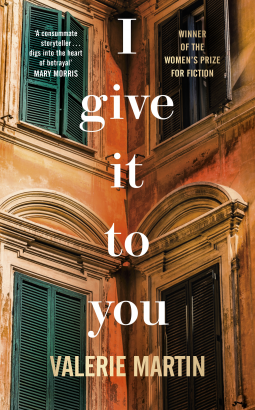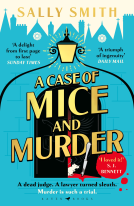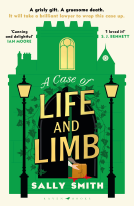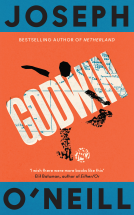
I Give It To You
by Valerie Martin
This title was previously available on NetGalley and is now archived.
Send NetGalley books directly to your Kindle or Kindle app
1
To read on a Kindle or Kindle app, please add kindle@netgalley.com as an approved email address to receive files in your Amazon account. Click here for step-by-step instructions.
2
Also find your Kindle email address within your Amazon account, and enter it here.
Pub Date 6 Aug 2020 | Archive Date 2 Jul 2020
Serpent's Tail / Profile Books | Serpent's Tail
Talking about this book? Use #IGiveItToYou #NetGalley. More hashtag tips!
Description
'Martin writes with amplitude, precision, grace and wit.' - Margaret Atwood
'Valerie Martin 'always produces something unexpected and revelatory.' - Jane Smiley
'Martin's writing is a reward in itself, a wonderful precision-tool. She uses it to chisel at the human condition - and the effect is astonishing.' - Financial Times
Jan Vidor seems like the ideal houseguest for a long summer holiday in a Tuscan villa. Unobtrusive but not antisocial, the quiet American academic can be relied upon to entertain herself - but her aristocratic hostess Beatrice has made a terrible mistake. An offhand remark about a violent death at Villa Chiara one night during the War piques Jan's writerly interest and sends her digging into the tragic past of the Salviati family. Does it matter if Jan just fills in the gaps? After all, Beatrice told Jan she could have the story to do as she liked with, she even said 'I give it to you'...
I Give It To You is a riveting novel about who owns a story, whether we have a right to what we inherit and what a gift really means.
Available Editions
| EDITION | Other Format |
| ISBN | 9781781255537 |
| PRICE | £14.99 (GBP) |
| PAGES | 288 |
Links
Featured Reviews
Italian setting brought me here and my goodness, it was such an excellent decision.
One lovely summer an American academic named Jan gets to rent out a room in a Tuscan villa. There she is to work on her book about Moussolini but ends up taking a life-long liking to espresso while she listens to stories of war-time fascism and how the volantile political climate has long been affecting Italy and its nobility.
Jan’s summer escape tenancy turns into something of a quest for objective truth. Not in a way a crazed detective cracks a case based on their ‘wall of crazy’ but in a way a persistent observer will eventually notice patterns and may see things a non-bystander never would. As she also befriends the villa’s owner Beatrice (do pronounce her name in Italian, it’s just so much better this way) and their friendship continues for years, her visits to the villa do not let up either. Each visit produces new interesting facts or observations.
This book snuck up on me. I have never before heard of the author (who apparently has won Orange Prize in the past and that is no small feat), nor have I read any of her past books. I did want to read this and picked it out on NetGalley because the cover reminded me of Italian countryside and it looked like historical fiction to me. I was right on both fronts. Interest sparked, I dived into it one night and couldn’t put it down till I hit the 30% mark. And it was nearing 4am on a work day!
Full transparency, the only character I definitely liked was Beatrice. Jan was an excellent observer, a trait a good storyteller needs to possess; unfortunately for me, she also came across as incredibly aloof and withdrawn and I’m just not a fan of this personality trait. I kept thinking she was sad all the time. That perhaps wasn’t the author’s intention or there was no particular intent in making her this or that. Still, I was desperate to know any strap of information that would tell me a thing about her aside from her work as an academic. Beatrice was an academic and how bustling with life and energy she was! But as most of the story was written from Jan’s POV, it also served for an efficient and fault-proof way to tell a story that needed to be voiced in an objective way. I understand that it wasn’t Jan’s story insomuch as she was a tool the story got to be told through. (Hence me chunking off a star what would otherwise have been a 5 star read.)
„I Give It To You” is a book you read for the real-life slow burning drama of the villa and the family that owns it. It’s a delightful story written with omnipresent penmanship skill but it is a sad one. The resentment being the chief emotion wreaking havoc on the villa and its family and it shows and it burns as you read but you also can’t get enough so you keep flipping the Kindle pages. I loved to learn much of the inner workings of Italy post-war and to read about that time in general. I have not had much of that style of storytelling - of real historical events getting intertwined with stories of people you may not like much but you nonetheless want them to be okay and free of pain. You want them to succeed and thrive.
We can safely assume that we always, whether we want to or not, choose sides. We root for one character or another. I tried not to but I did, too. Luckily it didn’t diminish my enjoyment of this book and I will remember it with great fondness, even if with a healthy dash of melancholy as well. Sadness or not however, was there ever anything more glorious than a real Italian espresso drunk with a cornetto on a side? I don’t think so. Especially if we picture two inteligent women conversing about life or nothing at all important (and yet!) in a garden of peaches, one listening closely, the other smiling indulgently.
I think this is one of those books where the blurb doesn't give a good sense of what we're getting: essentially, this is a multi-generational family saga following an Italian family through the twentieth century. The history is slightly displaced as it's partly told as inset narratives in the 3rd person, alternating with the 'present' 1st person where a novelist becomes fascinated with the family via her friendship with Beatrice, one of the women in the family, who recounts stories that Jan later turns into a novel.
The intriguing hook of the blurb, that this is about complicated questions of who owns stories and who has the right to retell them only lightly rears its head and then becomes a plot point at 98% and isn't treated with any depth.
So this is certainly enjoyable and is especially good on the complexities of Italy's fascist past (think a lighter, swifter, more popular and compact version of the Ferrara novels of Giorgio Bassani]) - just re-set your expectations to a superior family saga rather than anything more probing: 3.5 stars rounded up.
Readers who liked this book also liked:
Rick Riordan; Mark Oshiro
Children's Fiction, LGBTQIA, Teens & YA
Keith Martin; Konstantinos Mersinas; Guido Schmitz; Jassim Happa
Business, Leadership, Finance, Computers & Technology, Reference
Vincent B. "Chip" LoCoco
Historical Fiction, Horror, Mystery & Thrillers


















